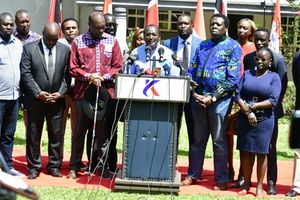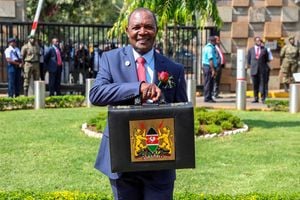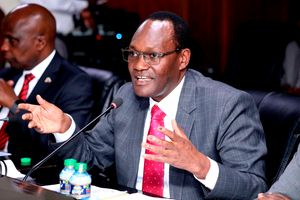
An activist is wrestled to the ground by security officers in Nairobi just before the reading of the budget proposals by Treasury Cabinet Secretary Njuguna Ndung'u on June 13, 2024.
Members of the National Assembly face pressure from the public, political parties, the civil society and businesses that will be affected by the plan to raise an additional Sh347 billion in the next financial year, with calls to reject the Finance Bill, 2024 which will be tabled in the House on Tuesday.
Kenyans have been using the #FindMyMP initiative on social media to share the contacts of lawmakers.
“I can’t sleep. The phone is vibrating throughout,” Mumias East MP Peter Salasya said on Friday.
“I’m waking up to numerous messages from Kenyans telling me to reject the Finance Bill, 2024,” tweeted Migori Woman Representative Fatuma Zainab.
Many lawmakers told the Saturday Nation that they have been added to WhatsApp groups and are receiving calls and text messages from their constituents calling on them to shoot down the bill that has been described by many as punitive.
In a statement, opposition Azimio la Umoja One Kenya leader Raila Odinga told MPs affiliated to the alliance to vote against the bill.
President William Ruto has called a Kenya kwanza coalition Parliamentary Group meeting at State House, Nairobi, on Monday where he is expected to whip the lawmakers to pass the bill.
Already, the opposition Orange Democratic Movement (ODM) through Secretary-General Edwin Sifuna, has written to its 86 National Assembly members to suspend any engagements that may make them be out of the capital city as the House is to debate the bill.
The Second Reading of the bill is on Tuesday.
“I have been instructed by the Party’s Central Management Committee to write to you that you be present in the House for the duration of the consideration of this Bill – from its tabling to voting,” reads the letter by the Nairobi senator.
“You are further requested to suspend any other engagements that would otherwise see you out of Nairobi during this critical period.”
Azimio la Umoja One Kenya on Friday directed its lawmakers to shoot down the Finance Bill, 2024, citing “massive budgeted corruption and “punitive taxes” that will lead to closure of businesses and an economic shutdown.
In a statement read by Wiper Party leader Kalonzo Musyoka, the alliance talked of Sh1 trillion “budgeted corruption” in the Sh3.914 trillion expenditure plan for the 2024/25 financial year.
The “budgeted corruption”, the opposition said, is presented in the form of a Sh23.6 billion increase in recurrent expenditure.
The alliance specifically flagged increased allocations to the Office of the Executive President (Sh1.2 billion), Office of the Deputy President (Sh678 million), the Ministries of Defence (Sh11 billion), Foreign Affairs (Sh1.4 billion), National Treasury (Sh6 billion), Roads and Transport (Sh1.3 billion) and Cooperatives and SMEs (Sh2 billion).
“We highlight the following misplaced allocations: The National Treasury has Sh26 billion more in the name of development and the State Department for Devolution has an increase of Sh2.6 billion in development expenditure. If this regime believes in the success of devolution, these funds should form part of the Equitable Share to county governments,” the coalition said in its statement.
The opposition added that the proposed motor vehicle tax would raise the cost of car ownership and disrupt transport and logistics.
“It proposes a 2.5 per cent tax on the value of motor vehicles. If adopted, it will raise the cost of car ownership and result in higher insurance rates. It is predicted to have an impact on the transport and logistics industries, thereby increasing the cost of living via a multiplier effect,” Mr Musyoka said in Nairobi.
The Wiper Party chief added that the withholding tax on digital marketplaces levied at 20 per cent on non-residents and five on residents’ income would raise expenses for digital marketplace operators, leading to higher pricing for consumers.
“The budgetary allocations do not promote economic growth but betray Kenyans. This regime has concealed its true objectives of maintaining an oppressive and unequal system benefiting a select few under the illusion of progress,” Mr Musyoka added in the statement.
The decision by Azimio la Umoja One Kenya coalition sets the stage for a showdown with the government side, which has vowed to pass the bill.
The State House meeting as per the short text invite by National Assembly Majority Whip Silvanus Osoro, initially planned for Monday, was reschedule to allow National Treasury Cabinet Secretary Njuguna Ndung’u to read the budget highlights and for the Finance and Planning Committee to conclude the public hearings on the bill.
The Molo MP Kuria Kimani-led committee will table its reports on Tuesday.
Like he did with the Finance Bill, 2023, President Ruto is expected to read the riot act to Kenya Kwanza lawmakers who might be planning to oppose it on the floor of the House.
It is, however, important to note that voting on the bill will not take place on Tuesday.
Instead, the Finance and Planning Committee – currently in Naivasha considering the views of the public – will be tabling its report on that day.
The committee can recommend changes to the bill.
If those changes are adopted by the House, they will form part of the Final Bill, 2024 that will be assented into law by the President.
During public hearings on the bill, the proposal to introduce an annual 2.5 per cent motor vehicle tax, imposition of 16 per cent VAT on bread, 25 per cent on crude and refined vegetable oils, 16 per cent VAT on financial services and the increase of excise duty on financial service from 15 to 20 per cent were among the contentious clauses that were rejected by a majority of Kenyans.
Others were the proposal on 16 per cent VAT forex transactions and processing of cheques as well as 10 to 20 per cent increase on mobile money transfer charges and the eco levy of Sh150 per kilo on articles of plastic packaging.
National Assembly Majority Leader, Kimani Ichung’wah, yesterday admitted that he had received countless messages over the Finance Bill, 2024.
“I can’t count the messages received. I have blocked WhatsApp so I cannot join any group. I rarely read my WhatsApp messages. Those that have sent messages need to know that I cannot read them,” Mr Ichung’wah said.
Kitui Central MP, Makali Mulu, also said he has received many calls from constituents urging him to reject the Finance Bill, 2024.
“They call and send messages on SMS, WhatsApp and Facebook, telling me to reject the Finance Bill, 2024. I understand my constituents and have assured them that I will vote ‘No’,” Mr Mulu told the Saturday Nation.
“They are very brief in the calls. They just say:’Mheshimiwa, vote no to Finance Bill’ and hang up.”
Mr Mulu, however, added that his constituents and the rest of the citizens must understand that he and other lawmakers would push for amendments of the “offensive” clauses in Parliament, “but like in any democracy, the minority will have their say and the majority will have their way”.
Kitutu Masaba MP, Clive Gisairo, said he has been receiving messages from his constituents demanding that he rejects the bill.
He said he had not been added to any group or faced harassment.
“My number is in the public domain as I am always in touch with my people. I have received messages from my constituents and fully understand their concerns. I’m listening to them. We will do our best to help them,” Mr Gisairo said.
Lugari MP Nabii Nabwera said even though his constituents know his position on the Finance Bill, 2024, they are still calling and sending messages, reminding him to reject it on voting day.
“We are up to the task and will cross the bridge when we get there. As we speak, there is still nothing on the floor of the House,” the lawmaker said.
His Alego Usonga colleague, Samuel Atandi, said he supports the ongoing debate on the Finance Bill, 2024, adding that he had received 300 messages urging him to reject it by Thursday evening.
“I will definitely listen to my people and reject this bill. Leaders have no option but to listen to the people who voted for them,” the Alego Usonga MP said.
One of the messages sent to lawmaker reads: “Hi Mhesh, I hope you are doing well. We as your employer are directing you – not urging – to return that thing to the owner.”
There is a video doing rounds on X in which Mr Salasya is accosted by some individuals.
The Mumias East MP was shopping at a popular outlet near Nyayo National Stadium, Nairobi, on Thursday when the group approached him and demanded that he rejects the bill.
They also wanted him to declare his stand on the new taxes.
In Mandera, an MP faced a hostile crowd that demanded he rejects the bill “or face our wrath”.
Ms Shoba Gatimu on an X post asked Kenyans to identify businesses owned by lawmakers and boycott them if their owners vote for the Finance Bill, 2024.
“I’ve seen a list of Kenyan MPs and their contact details. Can we please crowd-source details on the businesses they own so we boycott them? If they hit us where it hurts by voting ‘yes’, we can hit them where it hurts,” Gatimu says in the post.
The campaign of sharing lawmakers’ contacts is a common in the United States.
On the US House of Representatives website, there is a clear procedure on how citizens can reach out to their leaders.
According to the website, if a citizen wants to get contact details of a representative, including the email address, he or she only needs to enter the lawmaker’s ZIP code.












